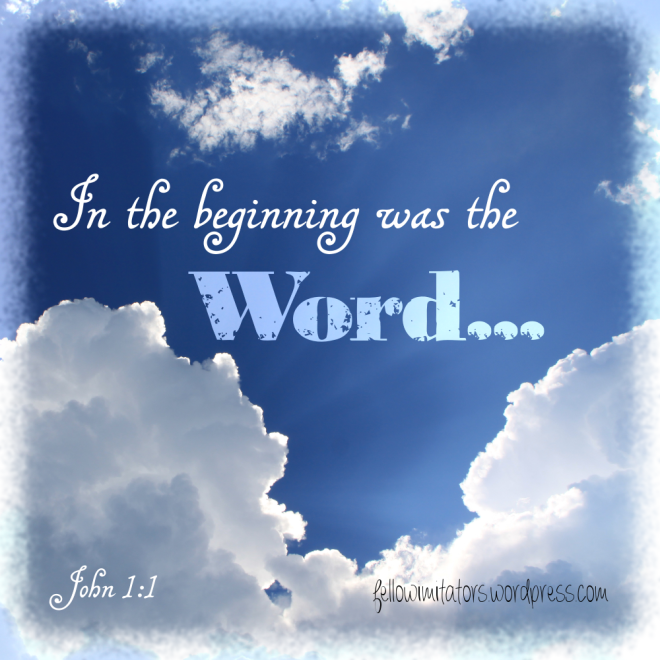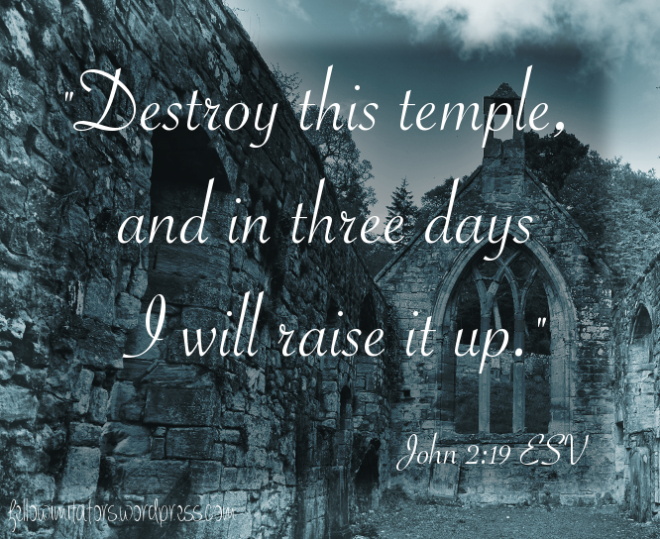
You may or may not have noticed a silence as of late, but if you want an explanation, let’s just say I was “regrouping”. Today, I’m going somewhere new…ish. I’ve always wanted to do a step by step study of John, so now I’m going to. We’re going to take a walk through John. We’re going to savor scenes and enjoy the intimacy with Jesus that John offers. Join me?
An Introduction
Before we dive into the text, let’s get to know our author and our book in general. The book of John was written, as the title suggests, by John. John was an apostle, one of the 12 (John 21:24). He was the son of Zebedee (Matt. 4:21). He refers to himself as “the disciple whom Jesus loved” (John 13:23). This is the same John who wrote 1, 2, & 3 John, and the book of Revelation.
This book is considered to have been written somewhere between AD 70 and AD 100. The theme of the book is easy enough to pick up upon: Jesus is the Messiah, the Son of God. God describes Himself as the great “I Am”, and John records eight different times where Jesus says “I am…” John’s purpose for writing this gospel is actually spelled out by the author in John 20:31. His purpose is twofold. He says “these things are written so that you“: 1) “may believe” and 2) “may have life“. What does he want us to believe? That Jesus is Messiah (John 1:41) and that Jesus is the Son of God (John 1:14, 18). The setting of this book is Palestine, during the rule of the Roman Empire. Although the Jews were in their land, once again, they had been conquered and were no longer the owners of the land. It is into this captivity that the true King was born. Now we shall dive into our text and we shall begin… in the beginning.
In the Beginning… (John 1:1-18)
We aren’t going to just begin at the beginning of John, John opens up at the beginning of time. Way back in Genesis when the Spirit of God hovered over the silent, dark waters, poised before the start of life. John begins:
“In the beginning was the Word, and the Word was with God, and the Word was God. He was in the beginning with God.” (John 1:1-2 ESV)
John goes on to say that all things created were made through the Word. Who is this Word that John speaks of? “And the Word became flesh and dwelt among us, and we have seen his glory, glory as of the only Son from the Father…” (John 1:14 ESV) The Word is the Son of God, the Word is Jesus. John is telling us that God created the world through Jesus. Everything. Lovingly handcrafted through His Son. “All things were made through Him…” (John 1:3 ESV)
In Genesis 1, God speaks life, His word creates. And as if that wonder were not enough, John tells us that Jesus was the life God spoken into creation. “In Him was life…” (John 1:4 ESV). And yet, even though creation was created through Jesus and He is in all we see, when He became flesh, “the world did not know Him” (John 1:10 ESV). We did not know Him… Imagine not recognizing the Creator… the very image we hold within each of us. We did not know Him.
When first God spoke in Genesis, His word became Light, “which gives light to everyone” (John 1:9 ESV). Jesus is the Light, a Light that “shines in the darkness, and the darkness has not overcome it” (John 1:5 ESV). The New American Standard uses the word “enlighten”. To be enlightened means to gain greater knowledge or to be filled with light. Isn’t that what Christ does for us? Fills us with the light and knowledge of God?
The Word Became Flesh
The Word, through which all the known world was created, became the created and dwelt among His creation. He was the only Son of the Father born into flesh. Through Him came grace and truth. Through Moses came the Law, but through the birth of Christ came the birth of grace, grace upon grace. No longer are we condemned for our failure to keep the perfect, holy Law. Through Him, the only Son, we are given the right to become children of God, born not of blood…but of God (John 1:13 ESV). Children of God… with an inheritance in His Kingdom… no other gift would ever be so significant.
“No one has ever seen God” (and came back to tell us about Him) (John 1:18 ESV). But Jesus, being God, has seen God and was the only One Who was qualified to tell us about Him, to make God known in a way no man has ever done or will ever do.
John the Immerser
In this first chapter, we are introduced to another character, another man named John. He is not the author of the book, he is called “the witness”. A witness is someone who gives his testimony about a person or event. That was John’s purpose, he was born to give testimony to the coming of Christ. John (the author) makes it clear that John (the Immerser) was not the “light”, he was not the Messiah. And John (the Immerser), himself, tries to make it clear that he is only a voice of testimony. Someone greater was coming.
“…when the Jews sent priests and Levites from Jerusalem to ask him, ‘Who are you?’ He confessed, and did not deny, but confessed, ‘I am not the Christ.’ And they asked him, ‘What then? Are you Elijah?’ He said, ‘I am not.’ ‘Are you the Prophet?’ And he answered, ‘No.’ So they said to him, ‘Who are you? We need to give an answer to those who sent us. What do you say about yourself?’ He said, ‘I am the voice of one crying out in the wilderness, “Make straight the way of the Lord,” as the prophet Isaiah said’.” (John 1:19-23 ESV)
A side note here, when John (the author) mentions “the Jews” he doesn’t mean ALL the Jews. Usually, he is referring to the group of Jews who were hostile to Jesus and His mission. Verse 24 says “they had been sent by the Pharisees”. The Pharisees were are sect of Jewish people who were known for their strict adherence to the Law and their position of power revolved around this. The phrase “holier than thou” definitely comes to mind when you think of this group. However, just as all Jews were not against Jesus, it is also important to note that not all Pharisees were either. But just as today, it is the ones with the loudest voice and the strongest opinions that seem to get all the attention.
We find John (the immerser) baptizing in Bethany near the Jordan river. He isn’t in the middle of Jerusalem crying from the temple gates or in the center of town, but he is out in the wilderness. And like Jesus, people come to him.
Baptism was not really a new practice and was connected to the Jewish practice of ceremonial washing. John was baptizing for the repentance of sin, but it is important to note here that John was not baptizing for salvation because Jesus had not died to make that salvation valid. Jesus, John says, doesn’t baptize with water, but with the Holy Spirit (John 1:33 ESV). John is the one who baptizes Jesus and the Holy Spirit makes Himself known when He descends on Jesus in the form of a dove after Jesus emerges from the water. Jesus’ baptism is almost like the passing of the baton. John’s ministry is coming to an end and Jesus’ ministry is just beginning. John saw all this and like the witness he is, he proclaims his testimony to all who will listen. “And I have seen and have borne witness that this is the Son of God.” (John 1:34 ESV)
“Come”
When we leave John the Immerser, we also see two of his disciples leaving him (the lesser) to follow Jesus (the greater). When Jesus noticed that John’s disciples were following Him and they ask Him where He is staying, He answers them with one word, “Come”. Just a simple word, and yet so full of meaning. He offers that same beckoning call to us today and as we will see with the disciples, once you answer that call, your life will never be the same.
Christ’s first followers were Andrew and one other. From the start, perhaps because of John’s testimony, these two believe that Jesus is Messiah because not long after they find out where Jesus is staying than Andrew runs to tell his brother, “We have found the Messiah!” (John 1:41 ESV). Andrew brought his brother to Christ and through his testimony, Simon followed and gets his knew name from Jesus: Cephas, which means Peter. It is interesting to see how one testimony leads to another which leads to another, and all roads lead to Christ.
Jesus calls others to “Come”: Philip, and Philip shares his testimony with Nathanael (who might be the “Bartholomew” of the other gospel accounts). A note about Jewish Rabbinic tradition here, usually the Rabbi waited until his disciples sought him out and then let them know if they were worthy enough to be followers and be taught by him. Jesus sought His own disciples and as to their worthiness to follow, they do not measure up to man’s idea of worthiness. They were not great men seeking to an ordinary following. They were ordinary men called to an extraordinary following.
Greater Things than These
Chapter One closes with the calling of Nathanael:
“Jesus saw Nathanael coming toward him and said of him, ‘Behold, an Israelite indeed, in whom there is no deceit!’ Nathanael said to him, ‘How do you know me?’ Jesus answered him,’Before Philip called you, when you were under the fig tree, I saw you.’ Nathanael answered him, ‘Rabbi, you are the Son of God! You are the King of Israel!’ Jesus answered him, “Because I said to you, ‘I saw you under the fig tree,’ do you believe? You will see greater things than these’.” (John 1:47-50 ESV)
And greater things were indeed to come…


